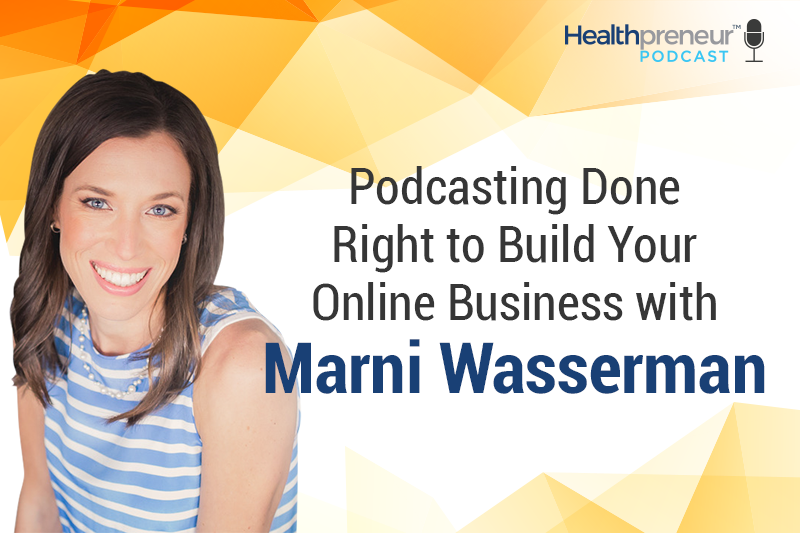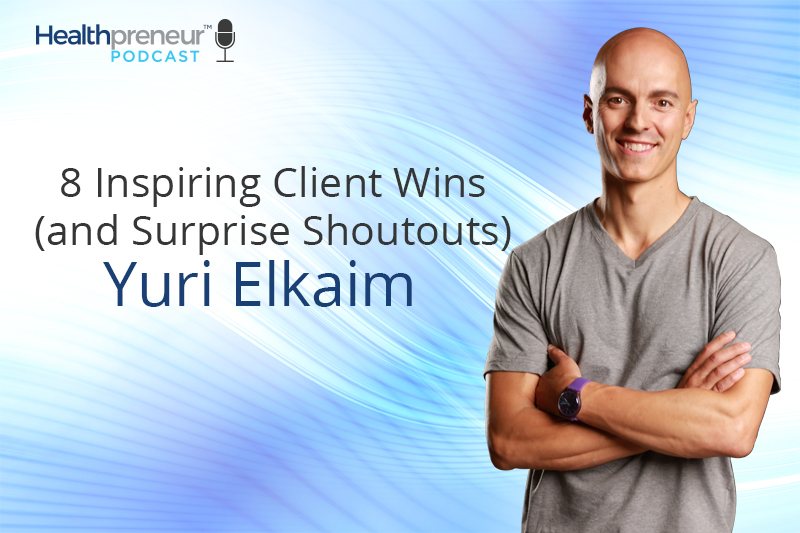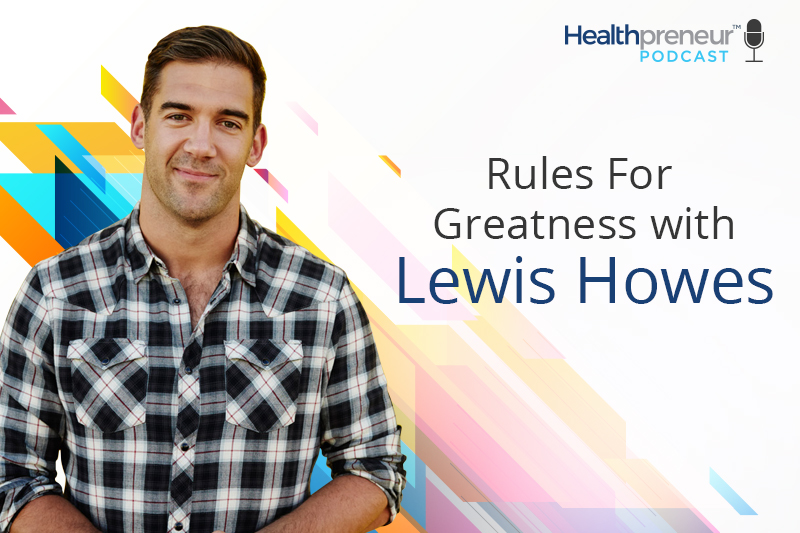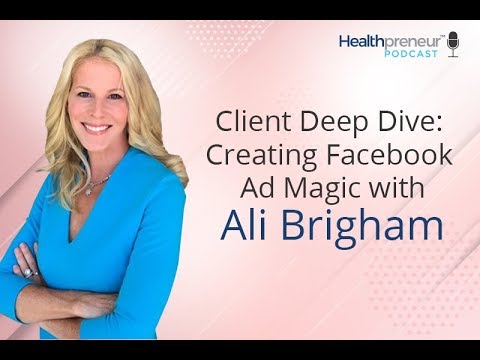How to Create “No-Brainer” Products That Other Influencers Are Happy to Promote with Mike Whitfield
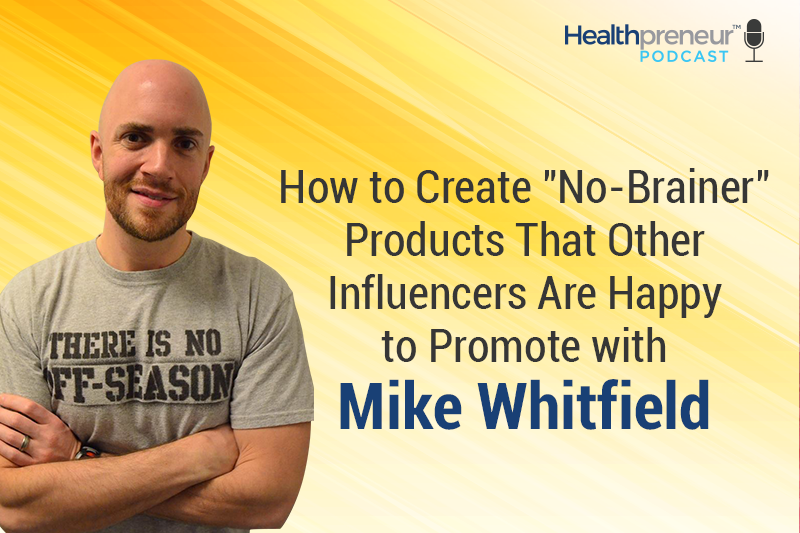
Welcome episode 73 of the Healthpreneur Podcast! Today, we are going to be chatting with Mike “Pancakes” Whitfield! (We’ll get into the pancake thing.) Mike is an old buddy of mine who figured out a way to support others in the industry while selling a product of his own.
In addition to his Workout Finishers and Cardio Afterburn products, Mike is the author of the book “Rise and Hustle: Transform Your Life Physically, Personally, and Spiritually in Just 90 Seconds a Day.” He walks the walk because he has lost – and kept off – 115 pounds for over a decade.
This episode is for any Healthpreneur who wants to know the secret to running a successful online business. Mike gives insider tips on crafting your “hook,” the value of feedback and surveys, and how relationships can transform your business. If you’ve ever felt like your product launch fell flat, or that your audience wasn’t connecting with you or your product as much as you believe they should, tune in. Mike’s advice is pure gold that’s sure to sweeten your conversions.
In this episode Mike and I discuss:
- How Mike found success by supporting the products of others.
- Finding your “hook” and using feedback to better your offering.
- How building long-standing relationships has transformed Mike’s business.
- Tenacity as a necessary trait of all successful entrepreneurs.
- The freedom and success that is built through consistency.
1:00 – 4:00 – Introduction and where the “Pancakes” came from
4:00 – 7:00 – Workout finishers and complementing other people’s existing products
7:00 – 8:30 – Overcoming the challenges of sales copy
8:30 – 12:30 – Figuring out “the hook,” the value of feedback
12:30 – 15:00 – Unforeseen challenges: Discovering the obstacle and the solution
15:00 – 18:30 – Appealing to the right audience
18:30 – 27:00 – Tenacity, establishing relationships, and consistency to build longevity
27:00 – 29:00 – The Rapid Five
Transcription
I’m pumped for today’s interview because I get to reconnect with my old buddy Mike Whitfield, aka Mikey “Pancakes” Whitfield. What’s that all about? You’ll find out in just a few moments when we bring him on the show.
I’ve known Mike for seven or eight years now and I remember the first time we met. He’s such a great guy, and not just because we’re both shaved-head, good-looking dudes, but because he’s such a giving and genuine person.
The first time I met him in person, I said, “Dude, you’re going to be a great addition to this online fitness biz. You’re a great person. You’re going to be very successful.” He came into a very competitive marketplace and figured out a way to support everybody else instead of competing with them. He’s going to share what he did in today’s interview.
Here’s a little background: Mike Whitfield is the author of “Rise and Hustle: Transform Your Life Physically, Personally, and Spiritually in Just 90 Seconds a Day.” He lost 115 pounds and has kept it off for over a decade, which propelled him into the fitness industry. He started an online business from scratch and did it full-time. His wife could quit her job and be a stay at home mom in just eight months.
You’ll see why Mike is such a special guy. Without any further ado, let’s bring Mike Whitfield on and get into it. Mikey “Pancakes” Whitfield, welcome to the Healthpreneur Podcast!
***********************************************************
***********************************************************
Introduction and where the “Pancakes” came from
Mike: Thank you for having me. I’m excited to be here.
Yuri: Right away, people ask, “Why do you call him Pancakes?” Let’s break the ice. Tell the listeners why Pancakes is attached to your name.
Mike: Absolutely. It’s Craig Ballantyne’s fault. Years ago, he put out a broadcast to his fitness readers and on his blog. He talked about how I like pancakes after a regular conversation that we had had at a Mastermind.
He talked about how he likes pancakes more than I do. I literally took offense to that because I’m the pancake extraordinaire. Nobody loves pancakes on this earth more than I do. So, I reached out to him and told him that was blasphemy.
From that point on, he introduced me to his list, which was way bigger than mine since I was just starting out, and fitness readers as Mikey “Pancakes” Whitfield. He even apologized for saying that he liked pancakes more than me. It turned into a joke and he grandfathered the name, Mikey “Pancakes” Whitfield. That’s how it came about.
And I do have a stack of pancakes every Sunday. It’s my weekly thing.
Yuri: That’s awesome. Maybe Craig can contribute the Canadian maple syrup but that’s about it, right?
Mike: Absolutely.
Workout finishers and complementing other people’s existing products
Yuri: I want to piggyback on what you just mentioned about how when you were just starting out, he had a bigger audience, but he started to introduce you to his audience. One of the things that I remember from when you were starting is that you came out with “workout finishers,” correct?
Mike: Yes.
Yuri: Talk to us about that. It was a smart way to introduce yourself into the market as opposed to coming out with a competitive product that everyone else has.
Was that intentional or just something you wanted to do? How did you come online and find that niche and how did that help you get started?
Mike: Craig had an opportunity for all the certified Turbulence trainers to do a guest blog on his blog. I took the opportunity to talk about finishers. At the time, because it was just for his audience, I talked about how you can simply tag a finisher onto the end of a Turbulence training workout. You didn’t have to change your entire workout; you could continue what you were doing and simply add in the finisher. It replaces cardio or intervals.
Most people are wired to go to the gym, do their work out, then go to the treadmill or elliptical for 30-45 minutes. I wanted to give people an alternative to save time. They could do this little 10-minute mini-burst at the end of very intense exercise to replace that.
I started out doing a two or three-part series on his blog. His readers responded so well that I drew a line in the sand and thought, that’s it! I’m going to create a product based on this. So, I put a compilation of 40 finishers together, and that’s how I got it out there. He was my first affiliate so I hit a grand slam with my first product. The timing was perfect, too.
I didn’t see it as another workout program because people are already on a workout program and there are already so many out there. I wanted to escalate the results that they were going to get from their existing program by simply adding in these finishers. I went in with the mindset of not wanting to compete but complement other people’s programs.
Yuri: Super-smart. Everyone becomes a potential partner.
Mike: Absolutely.
Yuri: Great. When you first started, what were some of the biggest challenges you had to overcome? How did you overcome them?
Overcoming the challenges of sales copy
Mike: I wasn’t intimidated by technology, but I had no experience in sales copy. There was a lot of room for me to do that. There was a lot of sales copy writing, rewriting, then rewriting again. Craig was cool about walking me through that process because he took me on as an affiliate and partner.
My biggest challenge was writing copy that resonated with people. The biggest thing that I remember from that one-day Mastermind that I went to way back in 2011, was Pedro saying that when you write out your bullets, do a benefit then add in the words “so that” to give them the end in mind.
In other words, let’s say you have finishers “so that” you lose weight even faster and look slimmer at your reunion. Something like that. That was one of the biggest key points I got from that Mastermind. But it was the sales copy.
Yuri: Sales copy is one of those things that matters. For you, was it just a matter of repetition and practice, or were there other resources that you turned to as you started to hone your skills?
Mike: At the time, it was just repetition and practice. One or two years later, I found a book by Michael Masterson titled “Great Leads: The Six Easiest Ways to Start Any Sales Message.”
Yuri: That’s a great book.
Mike: Yeah, that opened my eyes to different avenues of leading in with your sales copy. That strengthened my ability to write copy.
Yuri: Awesome. If you were to have a conversation with someone starting a business online today, whether an info product or coaching, what advice or steps would you give them to get some momentum going?
Figuring out “the hook,” the value of feedback
Mike: Without a doubt, you must figure out your hook. What makes your program standout from everything else that’s out there?
A trick I like to use is going to Amazon, finding a product like mine, then reading the one star reviews. There’s pure gold in there. People say what they didn’t like about that product so you can find out what’s missing.
What can you present with your product that’s not in the products that are already out there?
That’s a big one for me. There’s prewritten copy for you in those one star reviews.
Yuri: So figure out the hook and use Amazon one star reviews as fuel to feed that fire.
How do you know when you have a hook or a big idea that’s a winner?
Mike: One of the things I’ve done in the past is a two or three-day email series, so I’m not wasting time on sales copy. I write good articles about the product I want to release and see what kind feedback I get. Even if there’s just 30 people on your list, there will be a couple of people who will give their feedback.
And as a matter of fact, that’s one of the things I did when I came out with Workout Finishers 3.0 earlier this year, which I rebranded as Cardio Afterburn. I did a four-day series of articles on what they’re looking for, what’s missing from their existing finisher programs, and things like that. Come to find out, beginner options and joint-friendly exercises were missing.
I came out with 3.0 to give those options. I had come up with two different versions of workout finishers but none of them had beginner options. Jump squats, for example, are a great exercise. But not everybody needs to be doing jump squats. If somebody has knee issues or are 60 to 70 pounds’ overweight, they shouldn’t be doing a lot of jump squats.
I offered joint-friendly substitutions such as total-body extensions and kettlebell swings. The only reason I honed in and figured that out is because I did these articles and asked for feedback.
Yuri: Smart, and simple, too. It’s not like going to the moon.
I remember doing one of your finishers years ago. I was like, f-bomb this guy for putting me through this after I’m already toast from a workout! But no, it was great stuff. I just wanted to mention that to you.
If listeners want some cool follow-along workout finishers, go to workoutfinishers.com, and the 3.0 version is with beginner and joint-friendly options as well is cardioafterburn.com.
As you’ve built the business and it’s grown over the past couple years, what are some challenges that have surfaced that you didn’t foresee when you were first getting started?
Mike: Branching out. There’s a video sales letter for a product I put out in 2013 or 2014 that got over 1,000 clicks and one sale.
Yuri: That’s terrific. Welcome to the club of yet another failed VSL or offer.
Unforeseen challenges: Discovering the obstacle and the solution
Mike: Yeah, exactly. I didn’t have affiliates mail out for that, but it opened my eyes.
There’s different opinions on surveys. For me, I find them very powerful. I simply ask, what is the number one obstacle that is keeping you from losing weight? I get so many great answers from that not only for article ideas, but also broadcast, blog ideas, product ideas, and things like that. Bonuses.
The biggest thing was not going to my audience first. I just tried to throw something on the wall and see what sticks.
I just asked them what their obstacle was. Not, “What do you want to buy?” Not, “If I were to come up with a product, what would you invest in?” Instead, ask what their number one obstacle is and give them the solution to that obstacle.
Yuri: Awesome. There’s always a fine balance between knowing your audience’s pain points and your own innovative creativity to bring it all together. When we ignore our audience, it doesn’t end well.
Mike: Absolutely.
Yuri: Was that product shelved after that initial conversion data?
Mike: Yeah. I may bring it up again but right now it’s in the vault.
Yuri: What do you say to people who have a product idea, release it, and it doesn’t work out? When they lose hope, and feel discouraged, how would you encourage that person?
Mike: To not give up. A good example would be when I first launched. I branched out from my exercise thing and went with a product called Diet Free Weekends. It did above average.
One thing that you could do is you get feedback from those that bought the product, even if it’s not a lot of people. Get feedback to find out what’s missing and how you can make it better.
Come to find out, people didn’t like the fasting that was in the program. So, I tweaked the program, came out with a 2.0 version, and gave my existing customers a free copy. That version gave them fasting as an option. That way, they weren’t forced to fast.
It’s powerful to see what’s missing from the program, get feedback, and see how it sometimes relates to the hook as well.
A lot of people are on the cusp of something great, but it’s all in the hook. I’ve seen people rebrand. As a matter of fact, I was about to go into how I rebranded Diet Free Weekends into The Achievable Body to show how you can take the same product and give it a different hook.
I tried cold traffic to Diet Free Weekends and I had it on sale for, I think, $10. I sold two or three on three or four different emails. Granted, this list had only about 1,500 people.
I rebranded it into The Achievable Body. It was the same product with a different hook, video sales letter, and price boosted to $37. Just like that, I had four people buy it from cold traffic. It wasn’t even a completely different hook; it was just tweaked a little bit.
Many people are so close to breaking through with a product, but end up completely forgetting about it and going in a different direction. A small tweak can be a complete game-changer. Just looked at your hook or headline and asked yourself, “Does this solve a problem? Does this overcome people’s obstacle?”
Yuri: It’s true. It’s just the packaging, right?
It’s asking how to change the packaging, because it’s the same meaty good stuff inside. It’s easy to jump onto the next thing and say it didn’t work. But maybe there is something valuable in the product and you should just change the hook, the positioning, so it resonates in a different way.
And, obviously, never give up.
What do you think is one skill or trait entrepreneurs must possess for lasting success?
Tenacity, establishing relationships, and consistency to build longevity
Mike: Good question. The first word that comes to my mind is “tenacity.”
I don’t believe in the hustle mindset where sleep is overrated and you must work 20 hours a day. I don’t believe in that. But I do believe in doing something for your business every day, even when you’re having a bad day. You must have that tenacity to follow through.
Let’s not sugarcoat it. It’s hard. Having an online business is hard. But once you get it established and have momentum, the freedom that you have is incredible. And it’s totally worth that tenacity.

Yuri: Good. That’s something a lot of people don’t understand. In the offline, real world, if you built a studio, people can walk by or drive by and see it. Online, if you build up a website, no one will ever find it unless you develop your marketing chops and get in front of people. Having tenacity to get in front of more people is huge.
What have been the big movers for you in terms of getting your products and message in front of more people?
Mike: For me, affiliates. And that’s from establishing those relationships years ago. And always lending a helping hand, and that’s not just a cliché. It works.
Look at what your strengths are and see how you can help a potential affiliate. For instance, if you know an affiliate that’s willing to put together a squeeze page and you know Optimize Press or Click Funnels extremely well, say, “I can invest 30 minutes to an hour to put together that squeeze page for you. I’ve got some ideas for you, as well.” Or maybe you have an assistant that’s looking for extra work and they’re looking for an assistant. Little things like that.
There are several ways to establish these relationships. Fortunately, because of the connections I’ve had years ago, these are the same people. The people who mailed out my workout finishers way back in 2011 and 2012, are mailing out The Achievable Body, not only because of the product, but because of the relationship we have.
It’s friends helping friends. It’s priceless to have those relationships.
Figure out how you can add value to someone’s life, or a future affiliate’s life. Don’t look like, “If I help this guy out then hopefully he’ll mail for me for a couple months when I have my product done.” Don’t even think about that. Just go in and say, “How can I help this person?”
Just because, for one thing, it’s fun. It’s fun to help somebody out. Like this podcast. I can mention this to my readers and say, “Yuri’s got this fantastic podcast for entrepreneurs in the health industry. You should check it out.” I’ll send the link to iTunes because you have something valuable that I think could be extremely valuable to other entrepreneurs and I want to share that.
My list will appreciate that. So just go in with a helping hand, transparency, and don’t worry about the outcome. Go in and see how you can add value.
There are many things you can do to establish those relationships. You can shout out their product on Facebook. You can do some tech stuff for them. You can have your assistant help with customer service. You can create a graphic for them. You can offer a headline change.
Yuri: That’s awesome, man. That’s why you’re such a cool dude, right? You’re always thinking like that.
A lot of people in business, especially online, are looking for overnight success more than ever before. I don’t know if it’s because we see images of “success” on social. But they don’t even look at building relationships, they look at who will promote them.
Your perspective is better. I think it’s the way most people should approach business; don’t even ask anyone for anything until you’ve given them something first.
What’s been your biggest key to success? Outside of tenacity, let’s say.
Mike: Consistency.
Even when I have bad days, I continue to work on my business. I’m doing what I was born to do. Building a business is like losing weight. You’re going to have bad days and choose the wrong foods. That doesn’t mean your diet’s shattered and you should just forget it for the rest of the year.
Instead, think, “That was a bad day but tomorrow is going to be better because I’m going to make better decisions.”
Work on your business no matter what; even when things are not going well. I’ve been doing this since 2011 and I’ll still send out an offer from time to time, think it’s going to be a home run, and there’s only crickets. I could give up and say I’m going back to training clients like I used to so I know who’s coming in and know what kind of business I can build from that.
Instead, I get to spend time at home with my two young boys. I get to work out in the middle of the day with my wife. You can’t put a value to that. And so, because of that, I want to stay consistent.
Yuri: Awesome. What does that consistent action or set of actions look like in your business? What are those one or two things that you do consistently?
Mike: Writing emails. I email my list every day and try to give them actionable content. I used to be guilty of saying, “Check this out,” and it would be a link to a sales page.
I’ve gotten away from that because I’d rather give content. It’s certainly building my longevity. People have reached out to me and said, “Hey, I’ve been on your list since your workout finishers days back in 2011.” And it’s been cool. I’m about to bring on a coaching client that has been following me since I put those guest posts on Craig’s site back in the spring of 2011.
The biggest thing with consistency is building that longevity. I do that with emails and postings within the Facebook group. Even if they don’t buy something from the email, they can get something to put into their life to help them get healthier. And that’s my mindset. I can sleep at night doing it that way.
Yuri: It’s a good frame of mind to have. At every touchpoint, you add value to someone’s life.
I can give you some quantitative data on this. We have a couple ads on Facebook that we’re running for a webinar. The ad itself had two and a half more shares than links which is very unusual. It’s usually the other way around.
The reason is because the ad, in and of itself, is valuable even if they didn’t click on the link. Because of that, people are more likely to share it. What you’re doing with the emails is a great example of that. Even if people aren’t buying or clicking on a link, that time they spent reading your stuff is extremely valuable, and they’re going to stay on your lists.
They’re going to want to engage with you. These things are tough to measure but they’re important. I’m glad you mentioned it.
Mike: Definitely.
The Rapid Five
Yuri: So Mikey, are you ready for the Rapid Five?
Mike: Absolutely. This should be fun.
Yuri: We’re not going to sugarcoat these with maple syrup. We’re going to get right down to it. Five questions. Whatever comes top of mind. Nothing incriminating so it’s all good.
Number one, what is your biggest weakness?
Mike: Sugar.
Yuri: Hence the pancakes, right?
Mike: Yeah, absolutely. If you put something sweet in front of me, I’m going to eat it.
Yuri: Number two, what is your biggest strength?
Mike: I would say the act of encouragement. I’m good at encouraging people.
Yuri: That’s awesome. That goes a long way in people’s lives for sure.
Number three, what’s one skill you’ve become dangerously good at to grow your business?
Mike: Writing emails.
Yuri: Nice. Number four, what do you do first thing in the morning?
Mike: A specific quiet time routine. I pray, look at my devotion, then write in my gratitude journal. It’s automatic every day.
Yuri: Nice. Number five, complete this sentence: I know I’m being successful when…
Mike: I’m spending time with my family in the middle of the day.
Yuri: Nice. I love that. There we go guys, Mike Whitfield.
Mikey, thank you so much for taking the time to share your wisdom and knowledge. It’s been a lot of fun to reconnect. Where is the best place for people to follow your stuff online and check out some of your programs?
Mike: They can go to riseandhustle.com and check me out on Facebook at Facebook.com/mikeywhitfield.
Yuri: Mikey, thank you for sharing your awesomeness with our audience.
Mike: You’re very welcome. This was fun.
Yuri: Awesome, buddy. Thank you.
***********************************************************
Yuri’s Take
Great interview, right? I want to recap on what he mentioned about friends doing business with friends. If your business is about selling products or having people promote you, your stuff, or your services, then it is very important to develop and nurture these relationships. At the end of the day, as the saying goes, your net worth is directly related to your network.
Never discount the importance of relationships.
Sometimes we let them fall through the cracks because we’re busy, don’t think it’s that important, and think we’ll get to it later. We might see someone at an event, rekindle that flame, and that’s great. But take little steps in between events and stay in touch with people. Send an email. Send thank you cards. Let them know that you’re thinking of them. It goes a long way.
Remember, we do business with people we like, whether that’s a client doing business with you, or you promoting someone else’s business. The stronger the relationship, the more likely it is to get that type of support. That’s what I want to leave you with today. I hope you’ve enjoyed this one.
Subscribe to the Healthpreneur Podcast on iTunes if you haven’t already. We’ve got a lot of great stuff coming your way.
We’re talking with Aaron Hinde on Friday about how he’s built FitAID LifeAID, an awesome beverage company that is now the official sponsor of the CrossFit Games, among other things. We’ll learn how they’ve built this terrific empire. We’ve got amazing guests coming on the show and inspiring solo rounds to give you insight and mindset shifts to think about your business in a more productive and profitable way.
One final thing before we finish: If you haven’t attended the Seven Figure Health Business Blueprint, check it out today. It’s an amazing free training. I guarantee it’s the best 75 minutes you will have spent on your business. I’ll walk you through the new way to build a six or seven figure online health coaching business without spending years doing so.
You don’t have to worry about building out funnels and all the other crazy stuff that most of us don’t like doing. I’m going to show you the newer, smarter way to build a profitable business that you love, impacts your clients at a deep level, and brings you a lot more profit in the process.
Does that sound good? If so, head on over to healthpreneurgroup.com/training.
With that said, I hope you have an amazing day. I look forward to seeing you on Friday. Continue to get out there, be great, do great, and keep up the great work.
***********************************************************
Follow Mike Whitfield At:
***********************************************************
Free Healthpreneur Health Profit Secrets Book
If you enjoyed this episode, head on over to iTunes and subscribe to Healthpreneur™ Podcast if you haven’t done so already.
While you’re there, leave a rating and review. It really helps us out to reach more people because that is what we’re here to do.
What You Missed
In our last solo round episode, I talked about how to make top-dollar selling your product – even if you’re not a guru.
In this episode, I break down the three key reasons why to charge premium prices. After that, we’ll dive into the how. Watch what happens when you shift your focus on delivering results, serving, and transforming people’s lives. Hint: It’s good!
If you’re selling any type of coaching or a physical product, this podcast is specifically for you. Healthpreneurs that know deep down that your product or service is worth so much more – this episode is for you, too.
Related posts
April 6, 2018
Podcasting Done Right to Build Your Online Business with Marni Wasserman
Today, I am chatting with…
January 20, 2019
Client Deep Dive Creating Facebook Ad Magic with Ali Brigham
How’s it going, Healthpreneurs?…




